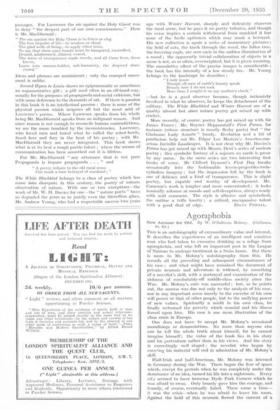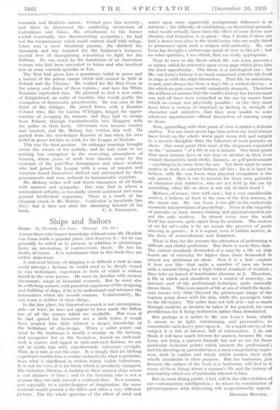Agoraphobia
Tins is an autobiography of extraordinary value and interest. It describes the experiences of an intelligent and sensitive man who had taken to excessive drinking as a refuge from agoraphobia, and who left an important post in the League of Nations to undergo treatment in a Swiss home. But there is more to Mr. Molony's autobiography than this. He records all the preceding and subsequent circumstances of his case ; and what might have remained the document of private neurosis and adventure is widened, by something of a novelist's skill, with a portrayal and examination of the sickness of comfortably-off middle-class society since the War. Mr. Molony's cure was successful ; but, as he points out, the success was due not only to the analysis of his case, nor in any important sense merely to the exercise of his own will power or that of other people, but to the unifying power of new values. Spiritually a misfit in his own class, he finally welcomed the poverty which scandal and his illness forced upon him. His case' is one more illustration of the class crisis in Europe.
One does not have to accept Mr. Molony's occasional moralisings or denunciations. No more than anyone else can he tell the whole truth about himself, for he cannot imagine himself ; the value of the book lies in his story and his portraiture rather thfin in his views. And the story is exceedingly well staged ; the novelist who began by coveting his material will end in admiration of Mr. Molony's skill,
Half-Irish and half-American, Mr. Molony was interned in Germany during the War. There began the fear of space which, except for periods when he was completely under the dominance of an idea, turned his life into a nightmare. Eve*, city seemed to have immense Hyde Park Corners which he was afraid to cross. Only brandy gave him the courage; and brandy, of course, eventually failed. There came a time— it was the crisis--when he was afraid to, leave his room. Against the hold of this neurosis flowed the current of 'a
romantic and idealistic nature. Oxford gave him security ; and there he discovered the conflicting attractions of Catholicism and Islam. His attachment to the former cooled eventually into discriminating sympathy ; he had not the temperament which could content itself with refuge. Islam was a mere theatrical passion. He disliked the Spaniards and was tempted (by the Irishman's tempera- mental love of championing minorities) to fight for the Riffians. He was cured by the fanaticism of an Australian woman who had been converted to Islam and who involved him in some comical episodes in Fez.
The War had given him a passionate belief in peace and a hatred of the prison camps which still existed in 1920 in Poland and the Ukraine. He worked for the Red Cross in the misery and chaos of these regions ; and here the White Russians captivated him. He planned to find a new order of Knighthood, an order of royalists who would purify the corruption of democratic governments. He was soon in the thick of the intrigue. He joined forces with a Russian Colonel Who, like Sir Lucius O'Trigger, longed for oppor- tunities of avenging his honour, and they had to escape from Poland, through Czechoslovakia into Hungary with the police at their heels. Adventure now became sinister and comical, and Mr. Molony has written this well. He parted from the war-hungry Russian at last when his own belief in peace led him to work for the League of Nations.
This was the final passion. An unhappy marriage brought about the return of his malady, and he had come to see nothing but corruption in the enervating atmosphere of Geneva, where years of work were thrown away by the cynicism of the post-War demagogues and where workers who had joined the League with a sense of mission and vocation found themselves shelved and sidetracked by their governments and were reduced to bureaucratic cynicism.
Mr. Molony writes well and draws characters of all kinds with acumen and sympathy. One may find in places a rationalised self-pity, a too easily stirred sentiment and some general intellectual vagueness. There is a touch of the eloquent crank in Mr. Molony, Confession is inevitably like this ; but it does not alter the absorbing interest of his book.V. S. PRITCHETT.











































 Previous page
Previous page